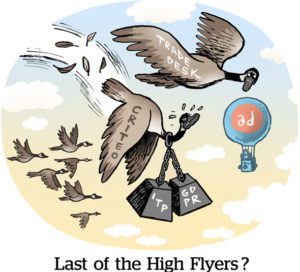 Amid fears of a recession and wild swings in the stock market, advertising technology companies are enjoying a renaissance.
Amid fears of a recession and wild swings in the stock market, advertising technology companies are enjoying a renaissance.
Since the start of 2019, shares of the video ad tech company Telaria have more than doubled in value, from below $4 to $10.45 as of this week. Rubicon Project also started the year trading below $4, and is up to $10.25. Cardlytics has more than tripled its market cap.
And that’s not counting The Trade Desk, which was priced below $50 before GDPR came into effect last May, jumped to $116 by the end of 2018 and is now sitting pretty at $242. With its market cap now hovering near $11 billion, The Trade Desk has become the first publicly traded ad tech company (not counting the big platform players) to reach large-cap stock status.
AdExchanger took a look at some of the factors driving these gains for the handful of ad tech natives on the stock market.
The Trade Desk has outstripped the DSP pack, and its scale is an increasingly valuable differentiator. The Trade Desk’s Unified ID cookie footprint is now a powerful asset, and Wall Street is betting on the company to win as TV advertising moves to data-driven platforms.
Cardlytics is expanding its banking loyalty marketing products to the programmatic ecosystem. Investors appear to like its proximity to credit card and purchase data.
Rubicon Project is closing in on profitability, with revenue up and outlays down after a round of layoffs last year. The SSP category holds little appeal to investors, but there is an appetite for companies that fit the bill as an “alternative to Google.”
Telaria is all-in on connected TV. It’s the exclusive Hulu SSP, and investors are looking for ways to bet on advanced TV growth.

Of course, not all ad tech stocks have seen dramatic gains. LiveRamp is up a mere 10% this year, from $38.75 to $42.25. And Criteo’s exposure to browser privacy changes has contributed to a 20% decline in its share price this year. Even so, the company still has among the highest valuations in the sector, at $1.2 billion.
Hot again?
This year’s upswing in ad tech valuations follows a period of pessimism and stock de-listings.
Two years ago, the publicly-traded ad network MaxPoint was acquired, and thus taken private, by Valassis. Early ad tech standouts Sizmek and Rocket Fuel were taken in by Vector Capital after their stocks cratered.
Managed media businesses and ad networks were the first to reach $100 million or more in revenue, and as a result were the first wave of companies to IPO, said Rubicon Project CEO Michael Barrett.
“Those companies tended to crash and burn, and people that got burned on ad tech made judgments that ad tech was a bad investment,” he said.
But successful IPOs and a more streamlined set of ad tech players on the market are gradually winning back the goodwill of institutional investors.
Financial transparency
In some cases, being a public company has also swung from liability to advantage in the eyes of investors. When privately-held Sizmek and Videology went bankrupt, each left ad tech partners and publishers with painful debts, and a lurking suspicion of private companies.
Even for unprofitable public companies, such as Rubicon Project and Cardlytics, the financial transparency required by SEC rules helps partners, clients and prospective investors trust they aren’t hiding liabilities.
“Being one of the very few public companies in the sector is a bigger advantage than it is a disadvantage,” Barrett said.
Privacy
Privacy concerns and data regulations weighed heavily on ad tech in 2017 and 2018. But as industry growth continues relatively unimpeded, investors are reconsidering the category.
“Chest-beating at the national level around privacy regulations can re-rate the whole sector at once,” said Peter Stabler, managing director of internet and ecommerce companies at ICR.
But as time goes by, advertising and data companies have mitigated their losses, he said. Companies like Cardlytics and The Trade Desk are constantly asked about targeted advertising and data sales by investors during earnings reports and at conferences, he said, and it’s a chance to defend their models and explain the difference between their anonymized data and the personally identifiable information owned by Google and Facebook.
“What’s interesting to me is how unimpactful GDPR has been,” said Mark Mahaney, who leads RBC Capital’s internet and tech equity investments.
Internet advertising companies have “proven their resilience” since Europe’s landmark privacy legislation, he said, and that’s helped support growth this year despite action from the US Congress, regulators and states.
Mahaney also said that persistently strong performances this year from the big players in the category – like Alphabet, Facebook, Roku and The Trade Desk – create a tailwind for smaller-cap companies that benefit from overall programmatic gains.
“What it tells you is how robust the internet ad market is across the board,” he said.
Investors are also coming around on non-walled garden companies in data-driven advertising.
“Investors used to just say, ‘Does Google do what you do? Does Facebook?’” Barrett said. “And if so, then the default response would be, ‘Why would I invest in that? You’re going to be cannon fodder.’”
He said nowadays investors that bet on companies like Google and Facebook are more likely to ask, “What’s the opportunity for an advertising alternative?”













